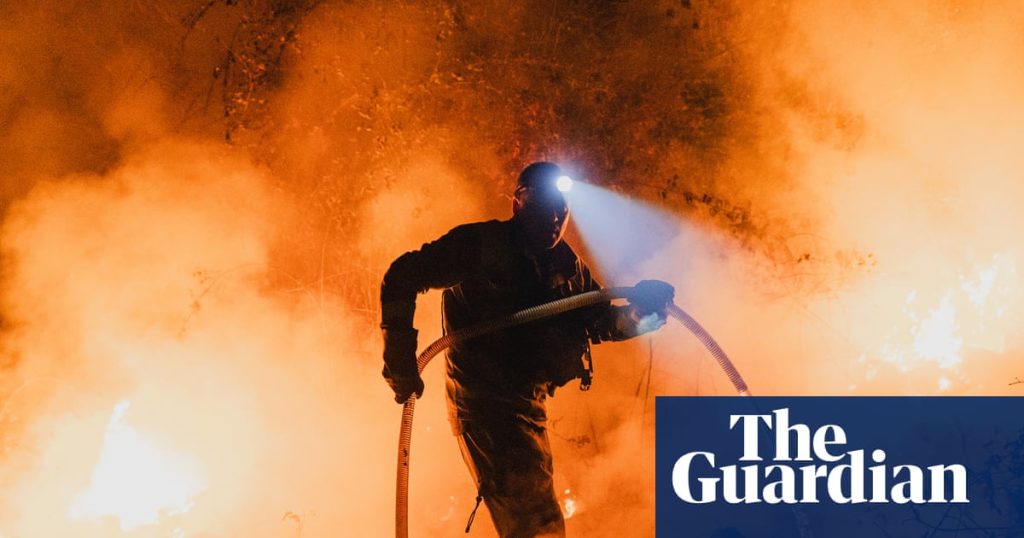Relentless heat and raging wildfires continue to ravage southern Europe, with one-quarter of weather stations in Spain recording 40C temperatures as the prime minister urged people to “leave the climate emergency outside of partisan struggles”.
The Spanish weather agency, Aemet, recorded a high of 45.8C in Cádiz on Sunday, as one in eight weather stations nationwide hit peaks of at least 42C (108F) It warned of “very high or extreme fire danger” in most of the country in a post on social media on Monday.
“Although the heatwave is starting to subside, very high temperatures will still be reached today in the east and south of the peninsula,” it said. “Be cautious.”
A fourth person was killed by the fires in Spain after a firefighting truck overturned on a steep forest road, while in neighbouring Portugal, which has also suffered extreme heat, another firefighter died, bringing the national death toll to two.
An extra 500 soldiers would join the 1,400 troops trying to bring deadly wildfires under control, the Spanish government said on Sunday. The prime minister, Pedro Sánchez, announced a “state pact” to tackle the climate emergency as he visited Ourense and León, one of the regions engulfed by flames.
“We need a strategy that anticipates a better, more secure, and more equitable response for our fellow citizens in the face of the worsening and accelerating effects of the climate emergency in our country,” said Sánchez.
“And that requires a great state pact that leaves the climate emergency outside of partisan struggles and ideological issues, where we focus on scientific evidence and act accordingly.”
Extreme heat, made hotter by carbon pollution, has fuelled devastating wildfires across southern Europe this month, the latest in a series of disasters exacerbated by climate breakdown amid a continental rollback of green policies.
The blazes have burned 530,000 hectares so far this year, more than double the average over the past two decades, and forced several overwhelmed governments from Spain to Bulgaria to seek firefighting help from the EU.
Portugal activated the EU’s civil protection mechanism on Friday with a request for four Canadair water-bombing planes.
The prolonged heatwave has broken temperature records across the continent. It is expected to die down in Spain after Monday, and has subsided in some countries over the weekend.
Météo France, the national weather agency, said temperatures were falling on Sunday but the wildfire risk remained high or very high in several regions in the southern half of the country.
“The Mediterranean and south-western departments of the country are experiencing significant drought, which means that vegetation is highly sensitive to fire,” the agency said on Sunday.
Sign up to This is Europe
The most pressing stories and debates for Europeans – from identity to economics to the environment
Privacy Notice: Newsletters may contain info about charities, online ads, and content funded by outside parties. For more information see our Privacy Policy. We use Google reCaptcha to protect our website and the Google Privacy Policy and Terms of Service apply.
after newsletter promotion
In Portugal, which has been under a state of alert since the start of the month, large rural fires have killed two people and caused several injuries.
The minister for internal affairs, Maria Lúcia Amaral, extended the wildfire alert on Sunday until Tuesday night but left the press conference when journalists tried to ask questions, Portuguese media reported. André Ventura, the head of the far-right Chega party, called for her resignation. “We are reaching the limit of what is acceptable,” he said on Sunday.
In a radio interview on Monday morning, Spain’s defence minister, Margarita Robles, said the fires were unlikely to be brought under control until the heatwave ended later on Monday.
“We’re not going to be able to end this situation until the heatwave dies down,” Robles told Cadena Ser. “We’re seeing fires with different characteristics because of climate change.”
She said the Military Emergencies Unit (UME), founded to help deal with disasters, had never faced such challenging conditions.
“We’re seeing a fire situation that’s never been seen before. The UME hasn’t seen anything like this since it was established 20 years ago.”

